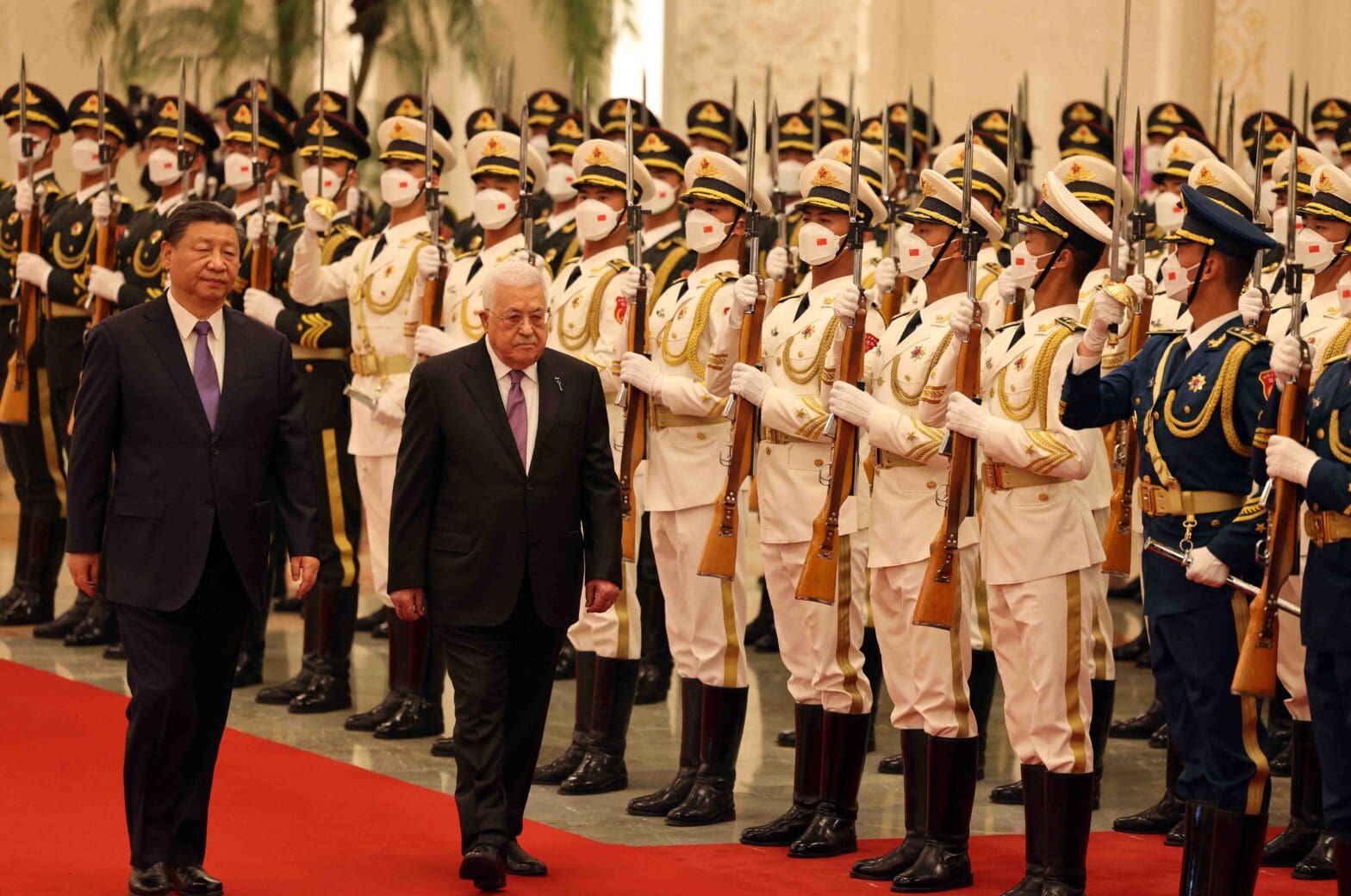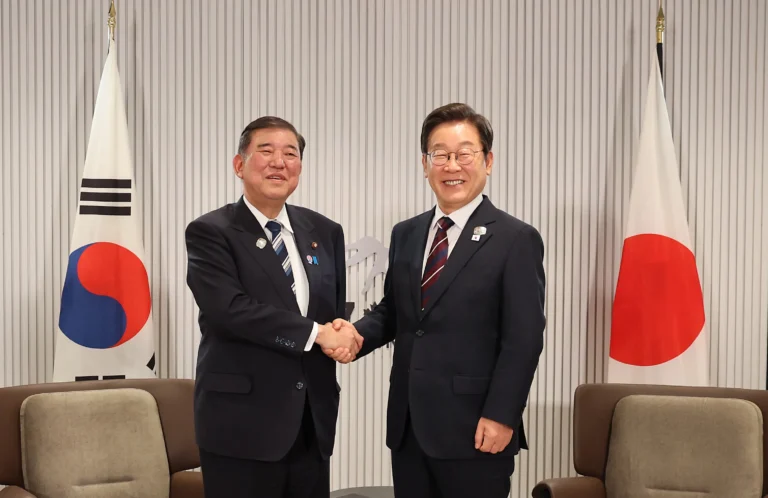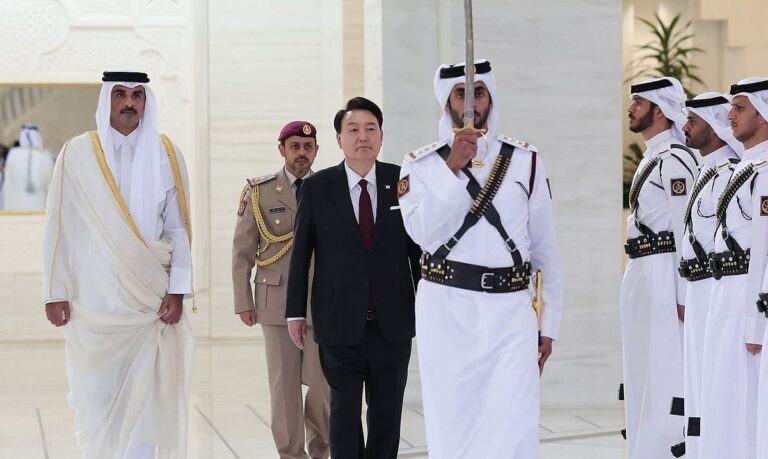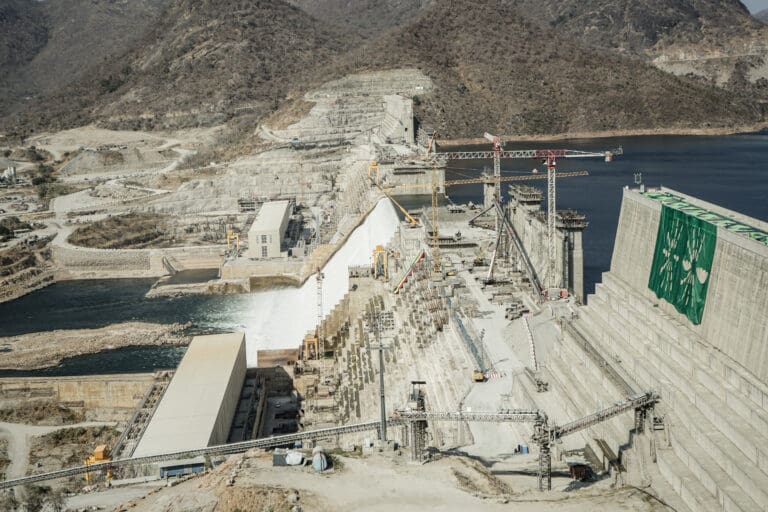
China's Approach to Palestine and Israel:
Towards a Greater Role?
Issue Brief, July 2024
Key Takeaways
Non-Interventionism Limits Beijing’s Efforts: Chinese foreign policy is largely directed by the principles of non-interventionism, non-alignment, and political neutrality. This complicates prospects for a more active diplomatic role. However, escalating regional tensions might jeopardize China’s economic investments and challenge these longstanding principles.
War on Gaza Provides China with an Opportunity in MENA Region: As China’s profile and interests in the Middle East continue to grow, the current crisis gives Beijing the opportunity to take a greater role in stabilizing the region and protecting Chinese interests therein without unduly sacrificing its core principles of engagement.
Increasing Diplomatic Engagement Through Successful Mediation: In 2023, China used its mutually positive relations and influence with Iran and Saudi Arabia to broker a game-changing rapprochement between the parties, while signaling an interest in greater political and diplomatic engagement in the region. Given its long history of positive relations with Palestinians and Israelis, Beijing could play a similar role but must be willing to chart an independent course of action that addresses core obstacles to mediation.
Boosting Credibility Through Multilateral Engagement: China should push its partners and allies to uphold and implement international measures of accountability on the parties, including through the United Nations Security Council and the international courts.
Introduction
Since October 7, 2023, China has responded to the unfolding crisis in the Middle East by supporting multilateral efforts to bring an immediate end to the violence in Gaza and contain a wider regional conflagration. It has done this primarily through engagement at the United Nations Security Council, where it is a permanent member, and in other international fora. Chinese officials have also embarked on high-profile visits to the region to engage stakeholders, including Israel and Hamas. In April, China also hosted the two major rival Palestinian factions, Fatah and Hamas, for reconciliation talks in Beijing.1
While China has clearly taken an interest in greater engagement and mediation, its efforts have remained relatively modest. Its recent initiatives conform to a long-standing approach characterized by non-interventionism, political neutrality, and abundant caution toward entanglement in the region’s myriad conflicts.
As such, the trajectory of the crisis on the ground has, to a great extent, been dictated by Israel and its backers in the West, who have largely deferred to the government of Israeli Prime Minister Benjamin Netanyahu and its maximalist war aims. The United States, in particular, has armed, financed, and provided diplomatic cover for Israel while also intervening militarily in the region to deter and punish other actors who have mobilized—purportedly in defense of Palestinians. This has prolonged the war, provided Israel latitude to carry out grave atrocities—including genocide, which credible accusations indicate is occurring—and inflamed the region. It has also delivered a blow to Western credibility globally.
China, for its part, has shown little interest in breaking new diplomatic ground or getting outside its comfort zone of engagement. China has also not been party to the central mediation track on a ceasefire and hostages, led by Qatar, Egypt, and the United States. At most, it has become increasingly critical of Israel and Washington, distinguishing itself from Western powers through support for the Palestinians while positioning itself as a possible mediator. Earlier this year, Wang Yi, China’s foreign minister, called for an international peace conference and reaffirmed Beijing’s support for the “two-state solution.”2
China’s limited approach can be attributed both to a lack of interest and to its longstanding principle of non-interference. The latter has been instrumental in shaping the country’s approach towards the Middle East and North Africa (MENA) region and is enshrined in the “Five Principles of Peaceful Coexistence” that underpin its foreign policy.3
Yet Beijing may be underestimating profound changes that are under way in the region as a result of the current crisis, which could threaten its interests in the future. China is also missing an opportunity to play a more constructive role by charting an independent course of action and using its influence to end the years-long political deadlock. Doing so would also allow Beijing to enhance its position as a leader on the international stage and enhance its diplomatic relations and standing in the MENA region.
China’s Historical Engagement with Palestine and Israel
China’s support for the Palestinians dates back at least to the beginning of the resurgent Palestinian national movement in the 1960s, when it was rooted in revolutionary and anti-colonial solidarity. In 1965, China became one of the first states to extend diplomatic recognition to the Palestine Liberation Organization (PLO) by hosting an office in Beijing.4 It was even one of the first suppliers of arms to Fatah, albeit clandestinely.5
While China consistently backed Palestinian national liberation, the revolutionary component waned over time. Instead, China channeled its efforts through the international consensus around the peace process, support for Palestinian statehood (it recognized the State of Palestine in 1988),6 and international institutions. China also retains strong bilateral ties to Palestine, agreeing in June 2023 to establish a bilateral “strategic partnership”7 and to continue to push for international recognition of the state.
In 1992, China also established formal relations with Israel, following the launch of the Middle East peace process and the end of the Cold War.8 Over time, Sino-Israeli relations deepened significantly. China’s emergence as a global economic superpower pushed Israeli efforts to expand economic ties, particularly in trade, infrastructure, and technology, leading China to become one of Israel’s largest trading partners. Between 2020 and 2022, China was the second-largest recipient of Israeli exports.9 In recent years, however, Washington curtailed the expansion of these ties—wary of its close allies and recipients of sensitive technology engaging too closely with Beijing.10 As a result, according to some Chinese policy experts, relations between the two countries have noticeably cooled.11
Despite its positive relations with both sides and its growing status within the international system, China was never included in formal mediation mechanisms such as the Madrid Peace Conference or the Middle East Quartet. Nor is it clear that China wanted to be included. Its regional economic interests have not been directly affected by the Israeli-Palestinian conflict, and the country has historically avoided involvement in the region’s conflicts. However, Beijing’s brokering of the Saudi-Iran peace deal in 2023 signaled the potential for an expanded Chinese role in regional diplomacy.
China’s limited diplomatic activity in the context of Palestine and Israel began after the Oslo peace process collapsed in 2000, as Beijing took a greater interest in regional affairs more generally. In 2002, at the height of the Second Intifada, China appointed Wang Shije as its first special envoy on the Middle East, tasking him primarily with engaging on the Arab-Israeli conflict.12 China has since offered to host peace talks on multiple occasions and even proposed a tripartite dialogue mechanism comprising itself, the Palestinians, and the Israelis. To drive these efforts, President Xi Jinping has also presented at least three separate four-point peace plans, beginning in 201313 and most recently in November 2023.14
The four-point proposals stressed the importance of global recognition of Palestinian statehood, maintaining negotiations between Palestine and Israel, and affirming the international community’s role in providing guarantees of Palestinian sovereignty.15 These proposals were supplemented by China’s Arab Policy Paper in 2016,16 which set out a framework for strengthening China’s ties with the region and highlighted the importance of Palestinian statehood to regional peace. This was followed by the 2023 Global Security Initiative,17 which underscored China’s desire to “support the League of Arab States (LAS) and other regional organizations” to play “a constructive role in … safeguarding regional security.”18
Yet China’s role remained marginal, particularly as the United States monopolized the role of mediator and kept Israeli-Palestinian negotiations within a bilateral framework, in keeping with Israeli preferences. Moreover, Chinese proposals were modeled on the standard international framework for mediation in the Israeli-Palestinian conflict. They therefore repeatedly failed to address the fundamental obstacle at the heart of the stalemate: the major imbalance of power between the two parties and the incentive structure this creates around altering the status quo. In other words, because of the power disparity between the occupier and the occupied, Israelis and the Palestinians approach the need for a political settlement from two starkly different perspectives. Until the cost-benefit calculus of the status quo and this power asymmetry are addressed, there will be no movement toward a diplomatic resolution to the conflict.
Furthermore, although China’s status as one of Israel’s largest trading partners and a global superpower give it leverage, Beijing has arguably not exercised it to date. Rather, it has, thus far, based its efforts on the assumption that both sides want a political resolution but simply lack an effective mediation framework.
Is China’s Growing Footprint Creating New Incentives for Engagement on Palestine?
China’s economic and geo-strategic interests have long driven its engagement in the MENA region, with less of an emphasis on political engagement. Beijing’s top priorities in the region include securing energy resources—particularly from its two largest oil suppliers Saudi Arabia and Iran, among other exporters in the Gulf Cooperation Council (GCC)—as well as securing access to vital shipping lanes and regional markets. As of 2022, China’s total annual goods trade volume with countries in the MENA region reached approximately $368.4 billion, which is more than double that of the United States.19 Chinese goods exports to the region grew from $140 billion in 2018 to $226 billion in 2022.20 China is also heavily engaged in the development of major infrastructure projects through its Belt and Road Initiative (BRI), making it a significant stakeholder in regional peace and security.
Importantly, China has sought to develop deeper ties and economic partnerships with all actors in the region, and at the same time avoid the myriad rivalries and conflicts between them. It has achieved this through policies of political neutrality and non-interventionism, allowing it to forge relations with foes such as Iran and Saudi Arabia, Türkiye and Egypt, Morocco and Algeria, and Israel and Palestine. Aside from developing comprehensive strategic partnerships with Saudi Arabia, Iran, Egypt, the United Arab Emirates, Algeria and most recently Bahrain,21 China also engages with the region through various multilateral mechanisms, such as the China-Arab States Cooperation Forum (CASCF), Forum on China-Africa Cooperation (FOCAC), and the China-GCC Strategic Dialogue. Middle Eastern states are also engaged with Chinese-led multilateral mechanisms beyond the region, such as the Shanghai Cooperation Organization (SCO).
While China’s security involvement in the region is relatively limited, its footprint in this sphere is also growing through arms sales, training, and military exercises. Countries across the MENA region are turning to Beijing for low-cost advanced arms.22 Between 2017 and 2021, the volume of Chinese arms exports to Saudi Arabia and the UAE grew by a striking 386% and 169%, respectively, compared to the 2012-2016 period.23 China’s military base in Djibouti, established in 2017, is also noteworthy, particularly as potential grows for an expanded Chinese military presence in the wider region.24 Still, Beijing appears disinterested in challenging the U.S. security architecture or positioning itself as an alternative. Indeed, China benefits from the existing architecture, particularly in the Gulf, without having to shoulder the financial and political costs of that role.
Nonetheless, it has been increasingly difficult for Beijing to ignore the destabilizing effects of U.S. regional policy and the risks that it poses for Chinese interests, particularly since the 2003 invasion of Iraq. In 2011, for example, the U.S.-led, North Atlantic Treaty Organization (NATO) intervention in Libya forced China to carry out its largest-ever overseas, non-combatant evacuation. Beijing extracted more than 35,000 nationals over 12 days, disrupting the operations of 75 companies and 50 largescale projects.25 The experience became a significant catalyst for Chinese military modernization, informed Chinese foreign policy for the next decade, and “underscored China’s perceptions of the irresponsibility of western nations in resolving conflicts.”26
The U.S. decision to pull out of the Joint Comprehensive Plan of Action (JCPOA) nuclear agreement with Iran, of which China was a signatory, and to reimpose crippling sanctions, is another example. While China ironically benefits from the sanctions regime because it is able to purchase Iranian oil at a steep discount, Chinese individuals and entities have been sanctioned by the U.S. for violating the embargo.27 The current crisis in the Middle East offers another stark example of the destabilizing effects of U.S. foreign policy, as the fallout of regional war poses significant risks for Chinese economic interests. Conflict in the region, particularly its effects on maritime transit, can impose serious commercial costs on China, which relies heavily on global supply chains.
The crisis has also put Chinese investment assets at risk. For example, in the months preceding October 7, Chinese firms had invested at least $20 billion in Egypt’s arterial waterway, as Beijing encouraged state-owned companies to invest in the North African country’s logistics, transport, and energy sectors.28 Egypt’s Suez Canal Economic Zone signed agreements worth $6.75 billion with China Energy and $8 billion with Hong Kong’s United Energy Group to bolster Egypt’s clean energy production capacities. However, the impact of Houthi attacks on maritime traffic through the Red Sea are jeopardizing the Suez Canal’s facilitation of trade between Asia and Europe and, by extension, risking China’s investments. Chinese shipping giant COSCO and a subsidiary also reportedly suspended shipping to Israel in January 2024.29
While Chinese assets and investments have so far been spared a significant hit, the persistent threat of direct Iranian military involvement or potential spillover in the Gulf are likely causing anxiety in Beijing. In late February, China deployed a naval fleet to the Gulf of Aden, purportedly for an anti-piracy mission, but it appears more likely that this was in response to tensions in the Red Sea.30
What Can Beijing Do? Opportunities, Challenges, and Limitations
China is unlikely to change its regional approach vis-à-vis Palestine and Israel unless it perceives that doing so would serve its national interests. However, the current crisis in Gaza could test China’s assumptions about the impact of the Israeli-Palestinian conflict on regional stability and the risks for Chinese interests in the region. Indeed, beyond the severe disruption caused by October 7 and the immense danger of regional war, the economic consequences of the current crisis could be more far-reaching than is currently being felt.31
Moreover, in the case of Palestine and Israel, the United States and other Western states appear too compromised by their domestic politics to play an evenhanded and stabilizing role in conflict management and resolution. Unwavering support from the United States and others for Israel’s campaign of destruction in Gaza and genocidal violence against Palestinians has inflamed the region and sowed the seeds of generational instability. Additionally, the U.S. security architecture in the region has arguably exacerbated regional tensions. For instance, some Arab states hosting U.S. military bases have imposed restrictions on their operations in order not to be implicated in U.S. military actions in support of Israel.32
This has created both the incentive and opportunity for China to play a greater role in diplomatic efforts aimed at bringing an end to the Israeli-Palestinian conflict. For one thing, China stands to greatly enhance its regional and international prestige, in juxtaposition with the United States, whose reputation has suffered immensely since October 7, particularly within the MENA region.33 China has framed itself in opposition to the United States since the crisis began and has heavily criticized Washington’s behavior at the UN Security Council, particularly its vetoes of successive ceasefire resolutions. China has also admonished Israel in increasingly strident language for its conduct in Gaza.
These efforts demonstrate Beijing’s new willingness to potentially challenge its long-standing neutrality to bolster its reputation for upholding international norms and rules and to benefit its standing among those seeking an alternative to the United States and Europe as reliable diplomatic actors. The Arab states’ growing disillusionment with the United States is already leading them to seek an expanded Chinese role in diplomatic efforts.34 China can indeed capitalize on its successful mediation between Saudi Arabia and Iran in 2023.
The benefits of this approach have limits, however, and even risks. If China were to restrict itself to a largely rhetorical and symbolic position without being able or willing to use its leverage to influence outcomes, it would risk looking weak—much like the European Union’s approach to Israel-Palestine for many years.35 If that happened, stakeholders would return to treating the United States as the only player with genuine leverage over the parties. China’s growing criticism of Israel should therefore be coupled with leveraging its economic ties to exert pressure.
To establish its credibility, China will have to do more than issue statements and offer itself as a mediator in an international conference. Luckily for Beijing, there is an option that could bear meaningful results, is in line with its current approach to international affairs and serves its interests. On May 24, 2024, the International Court of Justice (ICJ) ordered Israel to halt its operations in Rafah, in the south of the Gaza Strip, which it flagrantly ignored.36 This ruling followed one from January 26, 2024, requiring Israel to take six measures to avoid committing genocide in Gaza, which it also ignored.37 Notably, China intervened in the ICJ’s case regarding the legality of Israel’s 57-year-old military occupation. Ma Xinmin, the director general of the Chinese Foreign Ministry’s Department of Treaty and Law, called on the court to secure justice for Palestinians,38 arguing that Israel’s occupation is unlawful and that the Palestinians have an inalienable right to defend themselves against it.
In keeping with China’s policy of multilateral engagement, China should play a leading role at the United Nations General Assembly, urging states to maintain their obligations of upholding the court’s judgment. If China were to push its partners across the Global South to enforce the court’s decision by taking punitive measures against Israel, this would have multiple positive effects. Such a move would demonstrate China’s commitment to international laws and norms while the United States and Russia are losing credibility by blatantly undermining them. This would confer legitimacy on China as a force for peace and security and garner meaningful leverage over Israel beyond trade ties, while altering the cost-benefit calculus of the status quo of endless military occupation of the Palestinian Territories. The U.S. may find itself losing further influence internationally due to its position on Israel, something it is keen to avoid within the context of rising great power competition with China. This could incentivize Washington to loosen its grip over the mediation process and be inclusive of the Global South, something that would benefit Palestinians at the negotiation table.
Ultimately, such an approach may be too aggressive for a cautious power like China. Washington has been extremely protective of Israel, going as far as threatening sanctions against the International Criminal Court for issuing arrest warrants for Netanyahu and Defense Minister Yoav Gallant.39 As such, Beijing may be reluctant to confront the United States over this issue. It also likely knows how such an approach would be read in Washington—as fodder for those beating the drums of a new Cold War against China.
Conclusion
Since October 7, 2023, China has responded to the unfolding crisis in the Middle East by joining efforts to bring about a ceasefire and calling for an international diplomatic process to resolve the intractable Israeli-Palestinian conflict. However, thus far, China’s diplomatic initiatives have had little impact on the ground. While China is a cautious power that prefers to uphold its principles of political neutrality and non-intervention, the changing dynamics in the Middle East may necessitate a more assertive approach to secure the country’s interests in the region. Indeed, the current crisis provides new opportunities for China to expand its role without sacrificing its interests. China could also be a part of any future peace negotiations—as was the case with its role as a signatory to the JCPOA—and contribute to reconstruction efforts in post-war Gaza.
The importance of a more assertive Chinese role is further pronounced by the United States’ one-sided support for Israel and its failure over decades to reach a political resolution securing Palestinian statehood. While China possesses several important attributes that serve its position as a mediator, it is primarily constrained by its commitment to the principle of non-interference. This handicaps Beijing due to its unwillingness to exercise leverage over the parties and provide firm security guarantees. Having said that, the war on Gaza presents Chinese policymakers not only with an opportunity to stabilize a region in which it is heavily invested and show leadership on the international stage, but continue to be on the right side of history.






